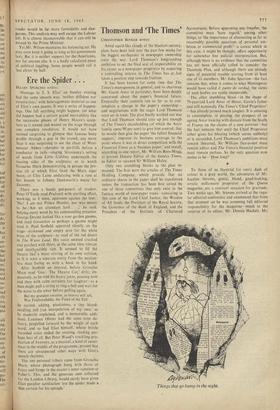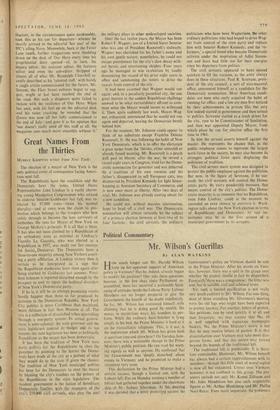Thomson and 'The Times'
CHRISTOPHER BOOKER writes: Amid squid-like clouds of the blackest secrecy. plans have been laid over the past few weeks for the biggest earthquake in newspaper ownership since the war. Lord' Thomson's longstanding ambition to set the final seal of respectability on his career as a newspaper proprietor by acquiring a controlling interest in 71ie Times has at last taken a positive step towards fruition.
It has been known for some time that The Times's management in general, and its chairman Mr. Gavin Astor in particular, have been deeply concerned about the paper's financial future. Eventually their concern ran so far as to con- template a change in the paper's ownership— and negotiations with the eager Lord Thomson were set in train. The plan finally worked out was that Lord Thomson should take up just enough of The Times's shareholding (of which the Astor family owns 90 per cent) to give him control; that he would then give the paper 'the fullest financial support,' improve its business coverage to the point where it was in direct competition with the Financial Times as a 'business paper,' and install, according to one report, Mr. William Rees-Mogg, at present Deputy Editor of the Sunday Times, as Editor to succeed Sir William Haley.
Only two stumbling blocks to the plan re- mained. The first were the articles of The Times Holding Company, which provide that no ordinary shares in the paper shall be transferred unless the transaction has been first vetted by one of those committees that only exist in the fantasy world of newspaper trusts--consisting in this case of the Lord Chief Justice, the Warden of All Souls, the President of the Royal Society, the Governor of the Bank of England, and the President of the Institute of Chartered
Accountants. Before approving any transfer, the committee must 'have regard,' among other things, to 'the importance of eliminating as far as reasonably possible questions of personal am- bition br commercial profit'-'—a caveat which in this case, it might be thought, offers opportunity for somewhat fine judicial interpretation. But, although there is no evidence that the committee has yet been officially called to consider the Thomson Plan, and although there are already signs of potential trouble stirring from at least one of its members, Mr. John Sparrow—the fact remains that, when it comes to what Hemingway would have called it pante de verdad, the views of such bodies are rarely insuperable.
The Other stumbling block—in the shape of 79-year-old Lord Astor of Hever, Gavin's father and still nominally The Times's 'Chief Proprietor' —has already proved much tougher. It is amusing to contemplate, in passing, the prospect of an ageing Astor looking with distaste from the South of France on the claims of a new arriviste—but the fact remains that until the Chief Proprietor either gives his blessing (which seems unlikely)• or is succeeded, Lord Thomson's ambitions must remain thwarted, Sir William like-as-not must remain editor and The Times's financial position must remain parlous. So the only question now seems to be—'How long?'
•
To those of us thankful for every dash of colour in a grey world, the adventures of Mr. Jocelyn Stevens, genial, blond, good-looking, erratic millionaire proprietor of the Queen magazine, are a constant occasion for gratitude. Two weeks ago, Mr. Stevens arrived at the regu- lar editorial conference and announced that from that moment on he was assuming full editorial responsibility for the magazine—much to the surprise of its editor, Mr. Dennis Hackett. Mr. Hackett, in the circumstances quite pardonably, took this as his cue for departure—whence he shortly arrived in the editorial 'hot seat' of the ]PC's ailing Nova. Meanwhile, back at the Fetter Lane ranch, further resignations were thudding down on the desk of Our Hero every time his proprietorial door opened—of, in turn, the deputy editor, the assistant editor, the features editor and even the sub-editor. Stripped of almost all of what Mr. Randolph Churchill re- cently described as his 'talented staff,' with barely a single article commissioned for the future, Mr. Stevens, the Fleet. Street vultures began to sug- gest, might at last have reached the end of the road. But such a diagnosis quite failed to reckon with the resilience of Our Hero. When last seen, with his feet up on the editorial desk and his voice cracking. he revealed that the Queen was now all but fully commissioned to the end of July—and gave it as his opinion that 'one doesn't really need all this staff at all; the magazine runs much more smoothly without it.'































 Previous page
Previous page